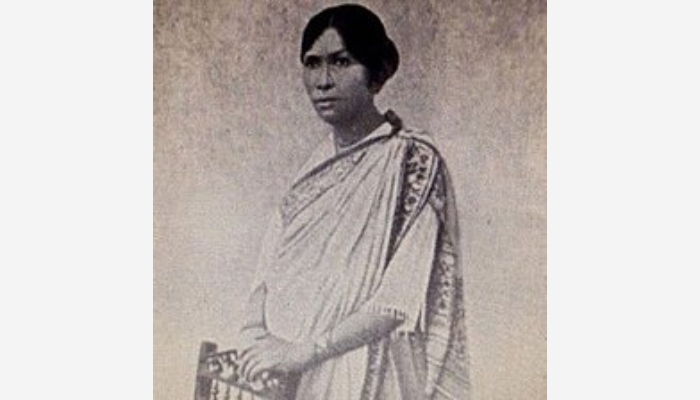
or

Regina Guha was an Indian lawyer and teacher. In 1916, she fought a notable case challenging the interpretation of legal provisions that effectively prohibited women from practicing law in India.
Regina Guha was born to Pearay Mohan Guha, a lawyer and Simcha Gubbay, a Baghdadi Jewish woman. Her father later converted to Judaism as well, and Regina and her three siblings were raised in the Jewish faith. Regina and her sister Hannah, studied law. Her sister, Hannah Sen, went on to become a teacher, and politician.
Regina completed her Master of Arts in 1913, earning a first-class degree, and standing first in her class. She went on to earn a law degree, the Bachelor in Laws in 1915, from Calcutta University. She then applied to be enrolled as a pleader (lawyer) in the Alipore District Judge’s court, but her application was rejected on the grounds that women were not permitted to enrol. Although, she challenged this decision at the Calcutta High Court, the judges didn’t rule in her favour. Later, she went on to become the headmistress of the Jewish Girls’ School in Kolkata, and was the first Jewish principal of the school.
The Legal Practitioners Act, 1879 used the word ‘person’. The journey of women to find space to practice law can be traced in Regina Guha’s case. She filed the petition desiring to be admitted to practice as a Pleader in the District of 24-Parganas. She paid into the Government Treasury of the said District the fee prescribed by Rule 27 of the Rules framed by the Hon’ble High Court under the Legal Practitioners Act and also presented her diploma, the receipt for the said fee and a stamp paper of necessary value of her first certificate to practice to the learned District Judge of 24-Parganas together, with the necessary application for admission. That the learned District Judge of 24-Parganas by a memorandum, dated the 3rd April 1916, forwarded the said application to the Hon’ble High Court for orders on petitioner’s enrolment.
Regina Guha’s application for enrolment as a Pleader in one of the Courts subordinate to this Court, under the rules framed in conformity with Section 6 of the Legal Practitioners Act, 1879 was the first instance of an application by a lady for enrolment as a Pleader, therefore a Special Bench heard her application, whether the Legal Practitioners Act, 1879 contemplated women practitioners.
Regina argued that the governing legislation, The Legal Practitioner’s Act, allowed qualified “persons” to enrol as lawyers, and that the definition of ‘person’ included women. She was represented by Eardley Norton, a lawyer and member of the Indian National Congress. A bench of five male judges of the Calcutta High Court ruled, in the case of In Re Regina Guha, that although the governing law, the Legal Practitioners Act 1879, used the term ‘person’ in regard to enrolment, this term did not include women. They accordingly denied her the right to enrol as a lawyer.
India, a newspaper published by the Indian News Agency from London, Bombay and Poona city, reported on September 1, 1916, that the “latest attempt on the part of a woman to break her birth’s invidious bar and get within the defences of a strictly guarded profession was made by a Bengali lady at the end of July”. The newspaper’s characterisation of Guha’s application as the ‘latest attempt’ was perhaps an allusion to the currents of transnational struggles by women to enter the masculinist public sphere as professional citizens on equal terms.
Although, Regina’s appeal was denied, she did start a spark that turned into a flame. Her attempts to open the doors of Legal practising for females. In 1923, the enactment of the Legal Practitioners (Women) Act eventually removed this restriction, allowing women to enrol and practice law. The act was passed after Guha’s demise, but her siblings established an endowment at Calcutta University in her memory to mark its passage.
The Calcutta Weekly Notes, while welcoming the decision of the legislative assembly to amend the law, noted that although “Miss Guha has passed away from the land of law courts and lawyers, but we have no doubt that she will be gratefully remembered by all future women lawyers as the first champion of their cause”w
The LW Bureau is a seasoned mix of legal correspondents, authors and analysts who bring together a very well researched set of articles for your mighty readership. These articles are not necessarily the views of the Bureau itself but prove to be thought provoking and lead to discussions amongst all of us. Have an interesting read through.

Lex Witness Bureau

Lex Witness Bureau

For over 10 years, since its inception in 2009 as a monthly, Lex Witness has become India’s most credible platform for the legal luminaries to opine, comment and share their views. more...
Connect Us:


The Grand Masters - A Corporate Counsel Legal Best Practices Summit Series
www.grandmasters.in | 8 Years & Counting
The Real Estate & Construction Legal Summit
www.rcls.in | 8 Years & Counting
The Information Technology Legal Summit
www.itlegalsummit.com | 8 Years & Counting
The Banking & Finance Legal Summit
www.bfls.in | 8 Years & Counting
The Media, Advertising and Entertainment Legal Summit
www.maels.in | 8 Years & Counting
The Pharma Legal & Compliance Summit
www.plcs.co.in | 8 Years & Counting
We at Lex Witness strategically assist firms in reaching out to the relevant audience sets through various knowledge sharing initiatives. Here are some more info decks for you to know us better.
Copyright © 2020 Lex Witness - India's 1st Magazine on Legal & Corporate Affairs Rights of Admission Reserved